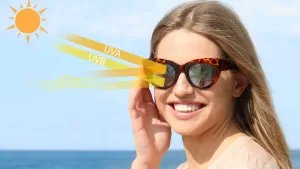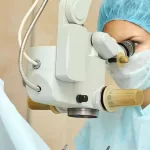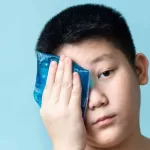
Protecting Your Eyes from UV Radiation: Essential Tips for Eye Health
Introduction:
Protecting your eyes from UV radiation is crucial for maintaining good eye health and preventing long-term damage. In this comprehensive guide, we will explore the importance of safeguarding your eyes from UV rays and provide you with practical tips to keep your vision safe.
Protecting Your Eyes from UV Radiation
Exposure to UV radiation can lead to various eye conditions, including cataracts, macular degeneration, and photokeratitis (sunburn of the cornea).
Protecting Your Eyes from UV Radiation: Essential Tips
1. Wearing UV-Protective Eyewear
To shield your eyes from harmful UV radiation, invest in high-quality sunglasses that offer 100% UV protection. Look for sunglasses labeled with UV400 or 100% UV protection, as they block both UVA and UVB rays. Additionally, ensure that the sunglasses fit properly and cover your eyes fully. This will prevent UV rays from entering through the sides and top of the frames.
2. Using Wide-Brimmed Hats and Visors
In combination with sunglasses, wearing wide-brimmed hats or visors provides an extra layer of protection for your eyes. These accessories help block out sunlight from reaching your eyes and reduce the amount of UV radiation exposure. Opt for hats with brims at least three inches wide for optimal protection.
3. Seeking Shade During Peak UV Hours
The sun’s rays are strongest between 10 a.m. and 4 p.m., so it is crucial to seek shade during these hours whenever possible. If you’re planning outdoor activities, try to schedule them before or after this period to minimize UV exposure. When shade is limited or unavailable, rely on sunglasses and hats for added protection.
4. Applying Sunscreen Around the Eyes
While applying sunscreen to your face, do not forget to extend its application to the skin around your eyes. Use a broad-spectrum sunscreen with an SPF of 30 or higher to protect the delicate skin from the harmful effects of UV radiation. Be cautious to avoid direct contact with the eyes when applying sunscreen.
5. Opting for Polarized Sunglasses
Consider choosing polarized sunglasses to enhance your eye protection. Polarized lenses not only reduce glare from reflective surfaces but also provide added UV protection and enhance visual clarity, making them an excellent choice for outdoor activities near water, snow, or other reflective surfaces.
6. Avoiding Tanning Beds
Tanning beds emit concentrated UV radiation, which can cause severe harm to your eyes and skin. Prolonged exposure to tanning beds increases the risk of eye conditions such as cataracts and ocular melanoma. To protect your eyes, it is best to avoid tanning beds altogether and opt for safer alternatives to achieve a tan.
7. Keeping Children’s Eyes Safe
Children’s eyes are particularly vulnerable to UV radiation. Ensure that they wear proper UV-protective eyewear and sun hats whenever they are outdoors. Encourage them to play in shaded areas and apply sunscreen around their eyes.
8. Regular Eye Examinations
Scheduling regular comprehensive eye examinations is essential for maintaining optimal eye health. Eye exams can detect early signs of UV-related damage and other eye conditions. An eye care professional can provide personalized recommendations based on your eye health and lifestyle.
9. Maintaining a Healthy Diet for Eye Health
A nutritious diet plays a significant role in maintaining good eye health. Include foods rich in antioxidants, such as leafy green vegetables, fruits, and omega-3 fatty acids, in your diet. These nutrients can help reduce the risk of age-related macular degeneration and other eye conditions.
10. Staying Hydrated for Optimal Eye Function
Proper hydration is crucial for overall health, including eye health. Dehydration can cause dry eyes, leading to discomfort and vision problems. Ensure that you drink an adequate amount of water throughout the day to keep your eyes and body well-hydrated.
Frequently Asked Questions (FAQs)
1. How does UV radiation affect the eyes?
UV radiation can damage the eye’s surface tissues, leading to conditions such as photokeratitis, or “sunburn of the cornea.” Prolonged exposure to UV radiation can also contribute to cataracts and macular degeneration.
2. Can UV radiation cause cataracts?
Yes, long-term exposure to UV radiation is a known risk factor for cataracts. By protecting your eyes from UV rays, you can help reduce the risk of developing cataracts.
3. Are all sunglasses equally effective in protecting against UV radiation?
No, not all sunglasses provide the same level of UV protection. Look for sunglasses labeled with UV400 or 100% UV protection to ensure they block both UVA and UVB rays.
4. Is it necessary to wear sunglasses on cloudy days?
Yes, UV rays can still penetrate cloud cover and reach your eyes on cloudy days. It is important to wear sunglasses with proper UV protection regardless of the weather conditions.
5. Can contact lenses provide UV protection?
Some contact lenses have a built-in UV filter, but they do not provide complete eye protection from UV radiation. To ensure comprehensive protection, wear sunglasses or UV-protective eyewear in addition to contact lenses.
6. What are the long-term consequences of not protecting your eyes from UV radiation?
Failure to protect your eyes from UV radiation can lead to various eye conditions, including cataracts, macular degeneration, and an increased risk of developing ocular melanoma.





